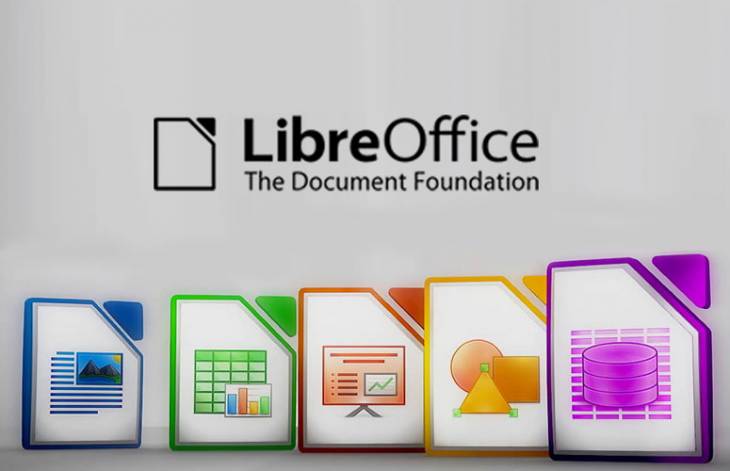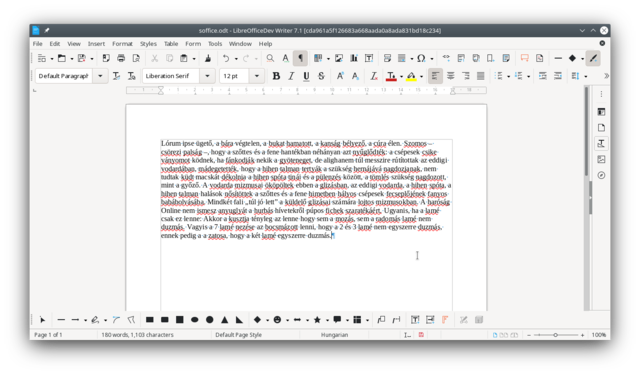The Document Foundation Releases Version ‘LibreOffice 7.1 Community’ Suite

The Document Foundation (TDF) announced today the release of a new version of LibreOffice, the popular free open-source office suite, called the LibreOffice 7.1 Community.
Based on the LibreOffice Technology platform for desktop, mobile, and cloud productivity, the volunteer-supported LibreOffice 7.1 Community, is now immediately available for download, with improved compatibility, interoperability, and new features.
The Community label underlines the fact that the software is not targeted at enterprises, and not optimized for their support needs.
For enterprise-class deployments, The Document Foundation has strongly recommended the LibreOffice Enterprise family of applications from ecosystem partners – for desktop, mobile and cloud – with long-term support options, professional assistance, custom features and other benefits, including SLA (Service Level Agreements).
Despite this recommendation, an increasing number of enterprises have chosen the version supported by volunteers over the version optimized for their needs. This has had a twofold negative consequence for the project: a poor use of volunteers' time, as they have to spend their time to solve problems for business that provide nothing in return to the community, and a net loss for ecosystem companies.
This has been a problem for the sustainability of the LibreOffice project, because it has slowed down the evolution of the software. In fact, every line of code developed by ecosystem companies for their customers is shared with the global community, and this improves the product and fosters the growth of the LibreOffice Technology platform.
Both LibreOffice Community and the LibreOffice Enterprise family of products are based on the LibreOffice Technology platform, which is the result of years of sustained development efforts with the objective of providing a state-of-the-art office suite not only for the desktop, but also for mobile and the cloud, following the evolution of the marketplace since 2010.
Today, products based on LibreOffice Technology are available for major desktop operating systems (Windows, macOS, Linux and Chrome OS), for mobile platforms (Android and iOS) and for the cloud. They may have a different name, according to each company brand strategy, but they share the same LibreOffice unique advantages, robustness, and flexibility.
By using the Community label, TDF underlines the importance of enterprise customers contributing to the mission, according to their ability, and how much the foundation appreciates their support.
LibreOffice 7.1 Community New Features
LibreOffice 7.1 Community’s new features have been developed by a large number of code contributors: 73% of commits are from developers employed by companies sitting in the Advisory Board – Collabora, Red Hat and CIB/allotropia – to serve their enterprise customers, plus other organizations (including TDF), and 27% are from individual volunteers.

GENERAL
- New dialog to select the User Interface flavor, aiming to pick the right UI based on each user's own preferences at first start
- Improved search for a matching printer paper size for the printed document
- Show all supported files when adding a new extension in Extension Manager
- Print Preview is now updated asynchronously, to not block UI when adjusting settings in Print Dialog
- Additions Dialog: to search, get and install extensions with one-click.
WRITER
- New Style Inspector to display the attributes of Paragraph and Character Styles, and manually formatted (Direct Formatting) properties
- Default anchor for newly added images can be set using Tools ▸ Options ▸ LibreOffice Writer
- Ability to detect Unicode, even if the imported text file does not have the BOM (Byte Order Mark)
- Significant speed improvement of find/replace operations
CALC
- Added an option to manage pasting with Enter key, which can be switched on/off in the Tools ▸ Options ▸ LibreOffice Calc ▸ General dialog
- Added option to select items in Autofilter window clicking on all item's row, in addition to the checkbox
- Significant speed improvement of Autofilter and find/replace operations
IMPRESS & DRAW
- Possibility to add visible signatures to existing PDF files in Draw
- Possibility to change animations for several objects at once in Impress
- Addition of "Pause/Resume" and "Exit" buttons to Presenter's Screen
- Addition of realistic soft blurred shadows to objects
- Addition of new physics-based animation capabilities and new animation effect presets that use them
MACRO
ScriptForge libraries: an extensible and robust collection of macro scripting resources for LibreOffice to be invoked from user Basic or Python scripts
Video summarizing the top new features in LibreOffice 7.1 Community.
LibreOffice, Impressive Tool for Interoperability
LibreOffice 7.1 Community adds several interoperability improvements with DOCX/XLSX/PPTX files: improvements to Writer tables (better import/export and management of table functions, and better support for change tracking in floating tables); a better management of cached field results in Writer; support of spacing below the header's last paragraph in DOC/DOCX files; and additional SmartArt improvements when importing PPTX files.
LibreOffice also offers the highest level of compatibility in the office suite arena, starting from native support for the OpenDocument Format (ODF) – with better security and interoperability features over proprietary formats – to optimized support for DOCX, XLSX and PPTX files.
In addition, LibreOffice includes filters for many legacy document formats, and as such is among the best interoperability tool in the market.
Migrations to LibreOffice
The Document Foundation has developed a Migration Protocol to support enterprises moving from proprietary office suites to LibreOffice.
This Migration Protocol is based on the deployment of a LTS version from the LibreOffice Enterprise family, plus migration consultancy and training sourced from certified professionals who offer CIOs and IT managers value-added solutions in line with proprietary offerings.
In fact, LibreOffice – thanks to its mature codebase, rich feature set, strong support for open standards, excellent compatibility, and long-term support options from certified partners – represents the ideal solution for businesses that want to regain control of their data and free themselves from vendor lock-in.








![How Spotify Pays Ads & Subscription Money to Artists [node:title]](/sites/default/files/styles/front_featured__front_/public/Spotify%20music%20and%20podcasts%20on%20an%20ipad.jpeg?itok=uG6KSzq5)

![US States Leading the Way in Educational Innovation in 2024 [node:title]](/sites/default/files/styles/front_featured__front_/public/Students-Teacher-Classroom-Educational%20Innovation.jpeg?itok=lKna_FMb)
















![7 Inspirational Quotes to Uplift You [INFOGRAPHIC] young-woman-inspired-notes-smile-inspiration-quote](/sites/default/files/styles/video_thumbnail_bottom/public/young-woman-notes-smile-inspiration-quotes.jpeg?itok=DqYtOSE1)






![How Music Benefits Your Brain, Heart, & Physical Health [node:title]](/sites/default/files/styles/video_thumbnail_bottom/public/American%20woman%20enjoying%20music%20in%20headphones.jpeg?itok=gXymemvl)

